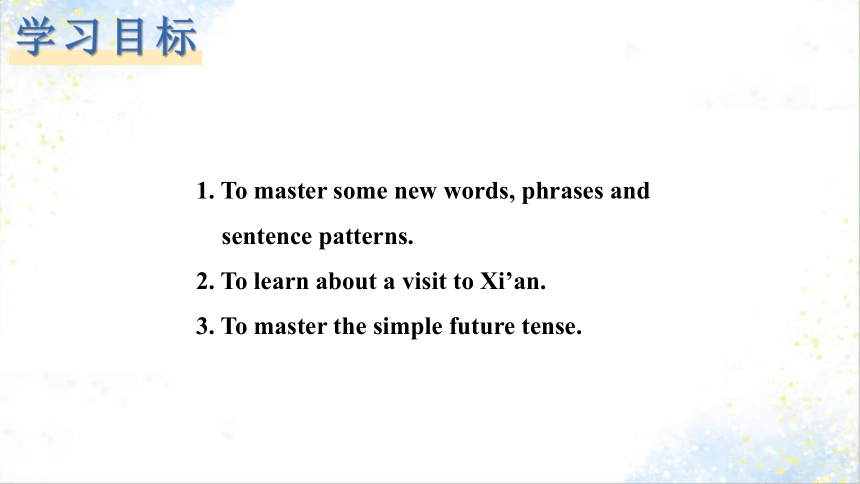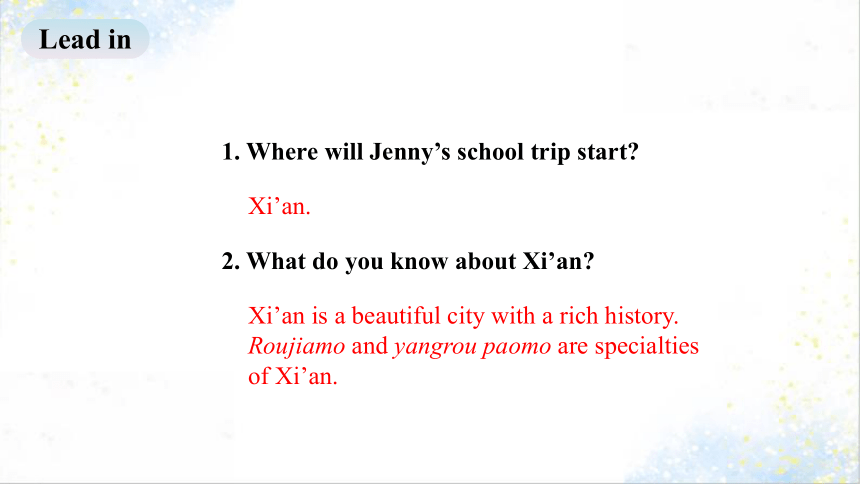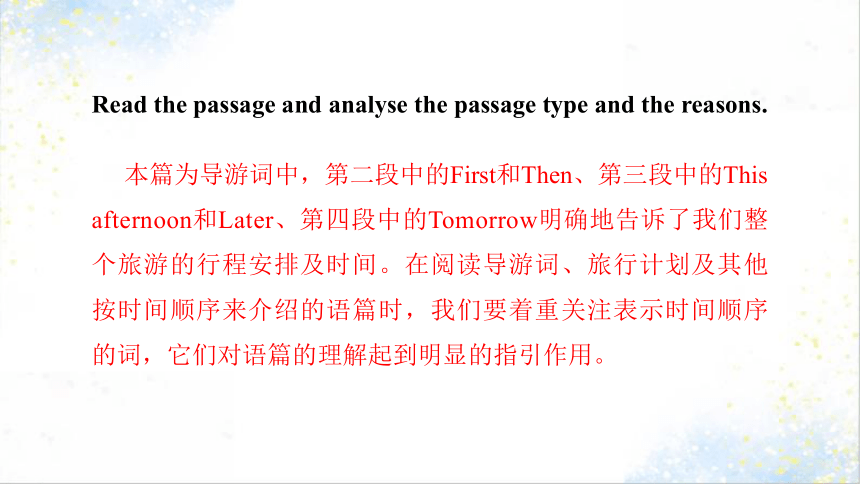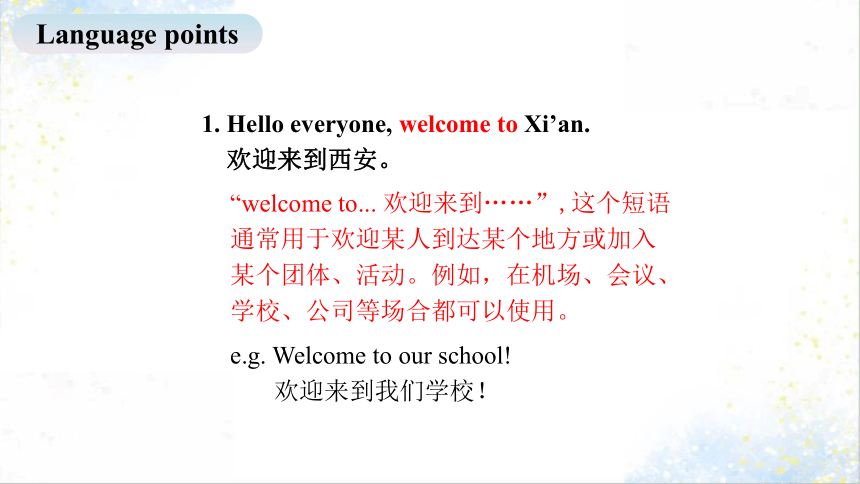Unit 1 A trip to the Silk Road Lesson 3 A visit to Xi'an课件(共28张PPT) 2024-2025学年翼教版(2024)版英语七年级下册
文档属性
| 名称 | Unit 1 A trip to the Silk Road Lesson 3 A visit to Xi'an课件(共28张PPT) 2024-2025学年翼教版(2024)版英语七年级下册 |  | |
| 格式 | pptx | ||
| 文件大小 | 1.7MB | ||
| 资源类型 | 教案 | ||
| 版本资源 | 冀教版 | ||
| 科目 | 英语 | ||
| 更新时间 | 2025-01-18 22:20:02 | ||
图片预览









文档简介
(共28张PPT)
Unit 1
A trip to the Silk Road
Lesson 3 A visit to Xi’an
学习目标
1. To master some new words, phrases and sentence patterns.
2. To learn about a visit to Xi’an.
3. To master the simple future tense.
Lead in
1. Where will Jenny’s school trip start
2. What do you know about Xi’an
Xi’an.
Xi’an is a beautiful city with a rich history. Roujiamo and yangrou paomo are specialties of Xi’an.
Free talk
新课讲授
What are they Where can you see these places of interest Look and talk.
the Big Wild Goose Pagoda
the Drum Tower
the Bell Tower
the Terra Cotta Warriors
You can see them in Xi’an.
Reading
Hello everyone, welcome to Xi’an. I’m so happy to meet you. I will show you around this ancient city.
First, we will walk along the City Wall. It is over 13 kilometres long and more than 600 years old. You can ride a bicycle on the ancient wall. Then we will go to the Drum Tower and the Bell Tower. You can enjoy wonderful shows there.
This afternoon, we will go to the Shaanxi History Museum. We will learn a lot about Chinese history. Later, we will visit the Big Wild Goose Pagoda. It is more than 1,300 years old.
Tomorrow, we will visit the famous Terra Cotta Warriors. They are more than 2,000 years old! We can also try some delicious Chinese food and enjoy the special dishes of Xi’an.
I hope you will have lots of fun!
Read the passage and number the places of interest.
□the Terra Cotta Warriors □the Big Wild Goose Pagoda
□the Drum Tower and the Bell Tower □the Shaanxi History Museum
□the ancient wall
5
4
2
3
1
Read the passage and analyse the passage type and the reasons.
本篇为导游词中,第二段中的First和Then、第三段中的This afternoon和Later、第四段中的Tomorrow明确地告诉了我们整个旅游的行程安排及时间。在阅读导游词、旅行计划及其他按时间顺序来介绍的语篇时,我们要着重关注表示时间顺序的词,它们对语篇的理解起到明显的指引作用。
Language points
1. Hello everyone, welcome to Xi’an.
欢迎来到西安。
e.g. Welcome to our school!
欢迎来到我们学校!
“welcome to... 欢迎来到……”,这个短语通常用于欢迎某人到达某个地方或加入某个团体、活动。例如,在机场、会议、学校、公司等场合都可以使用。
2. I’m so happy to meet you. 很高兴见到你们。
be happy to do sth. 很高兴做某事
相当于 be glad/pleased to do sth.
e.g. I’m happy/glad/pleased to meet you here.
我很高兴在这儿遇到你。
【拓展】“be+形容词+to do sth.”结构的主语通常为人 。该结构中的形容词通常为描述人的情绪的形容词,如:sorry、surprised、excited等。
e.g. I’m surprised to receive the gift.
收到那个礼物我很惊讶。
3. I will show you around this ancient city.
我将带你参观这座古城。
show sb. around sp. 带某人参观某地
show ... around 带……四处参观/逛逛/看看
e.g. My classmates showed me around Beijing.
我的同学带领我参观了北京。
Your school library looks as modern as ours. Can you show me around
你们学校的图书馆看起来和我们的一样现代。你能带我四处看看吗
show sb. sth.=show sth. to sb. 给某人看某物,向某人展示某物
e.g. She showed me her new dress.
= She showed her new dress to me.
她给我看了她的新裙子。
show n. 表演,演出;展览
on show 展出
e.g. a talent show 才艺节目
Some of his paintings are on show in the local art gallery.
他的一些画作在当地美术馆展出。
4. It is over 13 kilometres long and more than 600 years old.
它有超13公里长,600多年的历史。
“more than多于,超过”,相当于 over,常用于数词前。其反义短语为less than。
e.g. Now, there are more than 20 kinds of birds living around the river. 现在,河流周围生活着20多种鸟类。
His goal was to learn a new skill in less than two months.
他的目标是在两个月内学会一项新技能。
Grammar Focus
一般将来时
一般将来时表示将来某一时刻或将来某一段时间内发生的动作或存在的状态。我们可用will、be going to以及现在进行时来表示一般将来时。
句子谓语由“助动词will+动词原形”构成的一般将来时的句式结构
1. 肯定句:主语+will+动词原形+其他.
e.g. I/You//He/She will walk along the wall.
We/You/They will walk along the wall.
2. 否定句:主语+will not(won’t)+动词原形+其他.
e.g. I/You/He/She will not (won't) walk along the wall.
We/You//They will not (won't) walk along the wall.
3. 一般疑问句及回答:Will+主语+动词原形+其他
肯定回答:Yes, 主语+will.
否定回答:No, 主语+will not(won’t).
e.g. Will I walk along the wall
Yes, you will. No, you will not (won't).
Will we walk along the wall
Yes, we will. No, we will not (won't).
Will you walk along the wall
Yes, I will. No, I will not (won't).
Will you walk along the wall
Yes, we will. No, we will not (won't).
Will he/she walk along the wal1
Yes, he/she will. No, he/she will not (won't).
Will they walk along the wall
Yes, they will. No, they will not (won't).
4. 特殊疑问句:
特殊疑问词不作主语时:特殊疑问词+will+主语+动词原形+其他
特殊疑问词作主语时: 特殊疑问词+will+动词原形+其他
e.g. What will he do tomorrow 他明天要做什么?
Who will go with you 谁将和你一起去?
注意:①第一人称作主语,助动词还可以用shall。
②will常简略为’ll,与作主语的人称代词连写。例如:I’ll、you’ll、he’ll、she’ll、we’ll、they’ll、it’ll等。
句子谓语由“be going to+动词原形”构成的一般将来时的句式结构
1. 肯定句:主语+be going to+动词原形+其他.
e.g. I am going to walk along the wall.
He/She is going to walk along the wall.
We/You/They are going to walk along the wall.
2. 否定句:主语+be not going to+动词原形+其他.
e.g. I am not going to walk along the wall.
He/She is not going to walk along the wall.
We/You/They are not going to walk along the wall.
3. 一般疑问句及回答:Be+主语+going to+动词原形+其他
肯定回答:Yes, 主语+be.
否定回答:No, 主语+be not.
e.g. Are you going to walk along the wall
Yes, we are. No, we are not.
Are you going to walk along the wall
Yes, I am. No, I am not.
Am I going to walk along the wall
Yes, you are. No, you are not.
Are they going to walk along the wall
Yes, they are. No, they are not.
Is he/she going walk along the wall
Yes, he/she is. No, he/she is not.
4. 特殊疑问句:
特殊疑问词不作主语时:特殊疑问词+be+主语+going to+动词原形+其他
特殊疑问词作主语时: 特殊疑问词+be going to+动词原形+其他
e.g. What is he going to do tomorrow 他明天要做什么?
Who is going to go with you 谁将和你一起去?
注意:be going to结构中的助动词be随主语的人称和数而变化。
比较will型一般将来时和be going to型一般将来时
(1) will型一般将来时①表示说话人知道或认为将会发生某事。②表示说话人说话时所做的决定。
be going to型一般将来时①表示按计划或安排将要做某事,通常译作“计划;打算”等。②表示说话人根据已有的迹象推测将要或肯定会发生某事。
e.g. It will be New Year’s Day soon. 很快就是元旦了。
Look at the dark clouds! It’s going to rain.
看那些乌云!要下雨了。
(2) will型一般将来时①will没有人称和数的变化,will与人称代词连用时可以缩写成’ll。②其否定式为“will not (won’t)+动词原形”。。
be going to型一般将来时①be going to结构中的助动词be随主语的人称和数的变化而变化。②其否定式为“be not going to+动词原形”。
e.g. I’ll open the door at once.我立刻去开门。
She isn’t going to swim this afternoon.
她不打算下午去游泳。
现在进行时表示一般将来时
表示位置移动的动词,如go、leave、arrive等,可用现在进行时表示按计划或安排将要发生的动作。
e.g. We’re leaving for Beijing.
我们要动身去北京。
与一般将来时连用的时间状语
常与一般将来时连用的时间状语有tomorrow、tomorrow morning、the day after tomorrow、next Tuesday/month/year、in two hours 、in a few days 、in the future 、tonight、from now on等。在上下文没有明显的时间状语的情况下,我们需要根据语境进行推断。
e.g. The car will not start. What can I do
汽车启动不了,我该怎么办呢
Don’t worry. Tom and I will give it a push.
别担心,我和汤姆会来推一下。
Practice
Read the sentences, pay attention to the parts in yellow. Then fill in the blanks.
First, we will walk along the City Wall.
We will learn a lot about Chinese history.
Later, we will visit the Big Wild Goose Pagoda.
A —When _____ the show ______ (start)
—In ten minutes.
B Li Ming _________(visit) his grandparents next week.
C My bike is broken. I ________ (take) a bus to school this afternoon.
will
start
will visit
will take
Complete the conversation with the correct forms of the words.
take have watch call
Li Ming: Hi Jenny! Hi Danny! What are you up to
Jenny: We are visiting the Drum Tower. It is so big.
Danny: We__________Drum Beating Show. It will be fun.
Li Ming: Wow, sounds great! Where will you go tomorrow
Jenny: We will visit the Terra Cotta Warriors.
Li Ming: We______them Bing Ma Yong in Chinese.
Danny: I am looking forward to seeing the warriors!
Jenny: The day after tomorrow, we will visit Lanzhou.
Danny: I _________a picture with the Yellow River in the background!
Li Ming: I think you_________a great time.
will watch
你们在忙什么?
call
will take
will have
一、用所给词的适当形式填空
1. A famous writer ____________________ (give) us a talk tomorrow afternoon.
2. Many people think that there ____________________ (be) more robots in the future.
3. Teachers ____________________ (not use) chalk on the blackboard in 10 years’ time.
4. It is cloudy. I think it ____________________ (rain).
5. — ________ your father ____________________ (play) basketball with you this Sunday morning
— No, he isn’t.
6. Tomorrow, March 4th, we ____________________ (leave) for Shandong.
当堂检测
will give/is going to give
will be
won’t use
is going to rain
Is going to play
are leaving
二、根据汉语意思完成句子
1. 朋友们, 欢迎来到河北!
Friends, _________ __________ Hebei Province!
2. 今天我将带你们参观赵州桥。
Today I will ________ you ________ Zhaozhou Bridge.
3. 赵州桥有1400多年的悠久历史。
Zhaozhou Bridge has a long history of _________ _______ 1, 400 years.
4. 我希望你们玩得很开心。
I hope you will ________ ________ ________ ________.
welcome to
show around
more than
have lots of fun
Unit 1
A trip to the Silk Road
Lesson 3 A visit to Xi’an
学习目标
1. To master some new words, phrases and sentence patterns.
2. To learn about a visit to Xi’an.
3. To master the simple future tense.
Lead in
1. Where will Jenny’s school trip start
2. What do you know about Xi’an
Xi’an.
Xi’an is a beautiful city with a rich history. Roujiamo and yangrou paomo are specialties of Xi’an.
Free talk
新课讲授
What are they Where can you see these places of interest Look and talk.
the Big Wild Goose Pagoda
the Drum Tower
the Bell Tower
the Terra Cotta Warriors
You can see them in Xi’an.
Reading
Hello everyone, welcome to Xi’an. I’m so happy to meet you. I will show you around this ancient city.
First, we will walk along the City Wall. It is over 13 kilometres long and more than 600 years old. You can ride a bicycle on the ancient wall. Then we will go to the Drum Tower and the Bell Tower. You can enjoy wonderful shows there.
This afternoon, we will go to the Shaanxi History Museum. We will learn a lot about Chinese history. Later, we will visit the Big Wild Goose Pagoda. It is more than 1,300 years old.
Tomorrow, we will visit the famous Terra Cotta Warriors. They are more than 2,000 years old! We can also try some delicious Chinese food and enjoy the special dishes of Xi’an.
I hope you will have lots of fun!
Read the passage and number the places of interest.
□the Terra Cotta Warriors □the Big Wild Goose Pagoda
□the Drum Tower and the Bell Tower □the Shaanxi History Museum
□the ancient wall
5
4
2
3
1
Read the passage and analyse the passage type and the reasons.
本篇为导游词中,第二段中的First和Then、第三段中的This afternoon和Later、第四段中的Tomorrow明确地告诉了我们整个旅游的行程安排及时间。在阅读导游词、旅行计划及其他按时间顺序来介绍的语篇时,我们要着重关注表示时间顺序的词,它们对语篇的理解起到明显的指引作用。
Language points
1. Hello everyone, welcome to Xi’an.
欢迎来到西安。
e.g. Welcome to our school!
欢迎来到我们学校!
“welcome to... 欢迎来到……”,这个短语通常用于欢迎某人到达某个地方或加入某个团体、活动。例如,在机场、会议、学校、公司等场合都可以使用。
2. I’m so happy to meet you. 很高兴见到你们。
be happy to do sth. 很高兴做某事
相当于 be glad/pleased to do sth.
e.g. I’m happy/glad/pleased to meet you here.
我很高兴在这儿遇到你。
【拓展】“be+形容词+to do sth.”结构的主语通常为人 。该结构中的形容词通常为描述人的情绪的形容词,如:sorry、surprised、excited等。
e.g. I’m surprised to receive the gift.
收到那个礼物我很惊讶。
3. I will show you around this ancient city.
我将带你参观这座古城。
show sb. around sp. 带某人参观某地
show ... around 带……四处参观/逛逛/看看
e.g. My classmates showed me around Beijing.
我的同学带领我参观了北京。
Your school library looks as modern as ours. Can you show me around
你们学校的图书馆看起来和我们的一样现代。你能带我四处看看吗
show sb. sth.=show sth. to sb. 给某人看某物,向某人展示某物
e.g. She showed me her new dress.
= She showed her new dress to me.
她给我看了她的新裙子。
show n. 表演,演出;展览
on show 展出
e.g. a talent show 才艺节目
Some of his paintings are on show in the local art gallery.
他的一些画作在当地美术馆展出。
4. It is over 13 kilometres long and more than 600 years old.
它有超13公里长,600多年的历史。
“more than多于,超过”,相当于 over,常用于数词前。其反义短语为less than。
e.g. Now, there are more than 20 kinds of birds living around the river. 现在,河流周围生活着20多种鸟类。
His goal was to learn a new skill in less than two months.
他的目标是在两个月内学会一项新技能。
Grammar Focus
一般将来时
一般将来时表示将来某一时刻或将来某一段时间内发生的动作或存在的状态。我们可用will、be going to以及现在进行时来表示一般将来时。
句子谓语由“助动词will+动词原形”构成的一般将来时的句式结构
1. 肯定句:主语+will+动词原形+其他.
e.g. I/You//He/She will walk along the wall.
We/You/They will walk along the wall.
2. 否定句:主语+will not(won’t)+动词原形+其他.
e.g. I/You/He/She will not (won't) walk along the wall.
We/You//They will not (won't) walk along the wall.
3. 一般疑问句及回答:Will+主语+动词原形+其他
肯定回答:Yes, 主语+will.
否定回答:No, 主语+will not(won’t).
e.g. Will I walk along the wall
Yes, you will. No, you will not (won't).
Will we walk along the wall
Yes, we will. No, we will not (won't).
Will you walk along the wall
Yes, I will. No, I will not (won't).
Will you walk along the wall
Yes, we will. No, we will not (won't).
Will he/she walk along the wal1
Yes, he/she will. No, he/she will not (won't).
Will they walk along the wall
Yes, they will. No, they will not (won't).
4. 特殊疑问句:
特殊疑问词不作主语时:特殊疑问词+will+主语+动词原形+其他
特殊疑问词作主语时: 特殊疑问词+will+动词原形+其他
e.g. What will he do tomorrow 他明天要做什么?
Who will go with you 谁将和你一起去?
注意:①第一人称作主语,助动词还可以用shall。
②will常简略为’ll,与作主语的人称代词连写。例如:I’ll、you’ll、he’ll、she’ll、we’ll、they’ll、it’ll等。
句子谓语由“be going to+动词原形”构成的一般将来时的句式结构
1. 肯定句:主语+be going to+动词原形+其他.
e.g. I am going to walk along the wall.
He/She is going to walk along the wall.
We/You/They are going to walk along the wall.
2. 否定句:主语+be not going to+动词原形+其他.
e.g. I am not going to walk along the wall.
He/She is not going to walk along the wall.
We/You/They are not going to walk along the wall.
3. 一般疑问句及回答:Be+主语+going to+动词原形+其他
肯定回答:Yes, 主语+be.
否定回答:No, 主语+be not.
e.g. Are you going to walk along the wall
Yes, we are. No, we are not.
Are you going to walk along the wall
Yes, I am. No, I am not.
Am I going to walk along the wall
Yes, you are. No, you are not.
Are they going to walk along the wall
Yes, they are. No, they are not.
Is he/she going walk along the wall
Yes, he/she is. No, he/she is not.
4. 特殊疑问句:
特殊疑问词不作主语时:特殊疑问词+be+主语+going to+动词原形+其他
特殊疑问词作主语时: 特殊疑问词+be going to+动词原形+其他
e.g. What is he going to do tomorrow 他明天要做什么?
Who is going to go with you 谁将和你一起去?
注意:be going to结构中的助动词be随主语的人称和数而变化。
比较will型一般将来时和be going to型一般将来时
(1) will型一般将来时①表示说话人知道或认为将会发生某事。②表示说话人说话时所做的决定。
be going to型一般将来时①表示按计划或安排将要做某事,通常译作“计划;打算”等。②表示说话人根据已有的迹象推测将要或肯定会发生某事。
e.g. It will be New Year’s Day soon. 很快就是元旦了。
Look at the dark clouds! It’s going to rain.
看那些乌云!要下雨了。
(2) will型一般将来时①will没有人称和数的变化,will与人称代词连用时可以缩写成’ll。②其否定式为“will not (won’t)+动词原形”。。
be going to型一般将来时①be going to结构中的助动词be随主语的人称和数的变化而变化。②其否定式为“be not going to+动词原形”。
e.g. I’ll open the door at once.我立刻去开门。
She isn’t going to swim this afternoon.
她不打算下午去游泳。
现在进行时表示一般将来时
表示位置移动的动词,如go、leave、arrive等,可用现在进行时表示按计划或安排将要发生的动作。
e.g. We’re leaving for Beijing.
我们要动身去北京。
与一般将来时连用的时间状语
常与一般将来时连用的时间状语有tomorrow、tomorrow morning、the day after tomorrow、next Tuesday/month/year、in two hours 、in a few days 、in the future 、tonight、from now on等。在上下文没有明显的时间状语的情况下,我们需要根据语境进行推断。
e.g. The car will not start. What can I do
汽车启动不了,我该怎么办呢
Don’t worry. Tom and I will give it a push.
别担心,我和汤姆会来推一下。
Practice
Read the sentences, pay attention to the parts in yellow. Then fill in the blanks.
First, we will walk along the City Wall.
We will learn a lot about Chinese history.
Later, we will visit the Big Wild Goose Pagoda.
A —When _____ the show ______ (start)
—In ten minutes.
B Li Ming _________(visit) his grandparents next week.
C My bike is broken. I ________ (take) a bus to school this afternoon.
will
start
will visit
will take
Complete the conversation with the correct forms of the words.
take have watch call
Li Ming: Hi Jenny! Hi Danny! What are you up to
Jenny: We are visiting the Drum Tower. It is so big.
Danny: We__________Drum Beating Show. It will be fun.
Li Ming: Wow, sounds great! Where will you go tomorrow
Jenny: We will visit the Terra Cotta Warriors.
Li Ming: We______them Bing Ma Yong in Chinese.
Danny: I am looking forward to seeing the warriors!
Jenny: The day after tomorrow, we will visit Lanzhou.
Danny: I _________a picture with the Yellow River in the background!
Li Ming: I think you_________a great time.
will watch
你们在忙什么?
call
will take
will have
一、用所给词的适当形式填空
1. A famous writer ____________________ (give) us a talk tomorrow afternoon.
2. Many people think that there ____________________ (be) more robots in the future.
3. Teachers ____________________ (not use) chalk on the blackboard in 10 years’ time.
4. It is cloudy. I think it ____________________ (rain).
5. — ________ your father ____________________ (play) basketball with you this Sunday morning
— No, he isn’t.
6. Tomorrow, March 4th, we ____________________ (leave) for Shandong.
当堂检测
will give/is going to give
will be
won’t use
is going to rain
Is going to play
are leaving
二、根据汉语意思完成句子
1. 朋友们, 欢迎来到河北!
Friends, _________ __________ Hebei Province!
2. 今天我将带你们参观赵州桥。
Today I will ________ you ________ Zhaozhou Bridge.
3. 赵州桥有1400多年的悠久历史。
Zhaozhou Bridge has a long history of _________ _______ 1, 400 years.
4. 我希望你们玩得很开心。
I hope you will ________ ________ ________ ________.
welcome to
show around
more than
have lots of fun
同课章节目录
